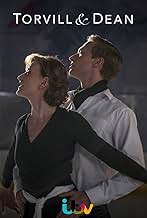Biopic of Britain's most famous ice skaters.Biopic of Britain's most famous ice skaters.Biopic of Britain's most famous ice skaters.
- Awards
- 2 nominations
Kevwe Emefe
- Receptionist
- (as Kevme Emefe)
- Director
- Writer
- All cast & crew
- Production, box office & more at IMDbPro
Storyline
Did you know
- ConnectionsFeatured in Good Morning Britain: Episode dated 24 December 2018 (2018)
Featured review
Whilst an interesting subject and done reasonably well for a TV Movie, Torvill and Dean's story deserves bigger treatment really.
It did hold one's attention and there were some things one didn't know before.
The cast did a pretty good job all in all.
One big pity is the lack of credits for the skaters who did all the work in this film.
Given the subject matter they deserve some recognition.
Details
Contribute to this page
Suggest an edit or add missing content






























